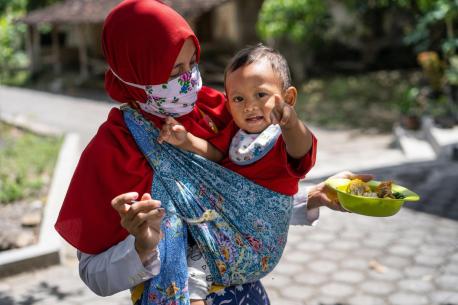
Averting a Lost COVID Generation: UNICEF's Six Point Plan
Armed with new data, UNICEF urges global coordinated action in six key areas to prevent and mitigate the pandemic's worst effects, warning that the future of an entire generation of children is at stake.
With the release of a new detailed report on the COVID-19 pandemic's far-reaching impacts, UNICEF is calling on the global community to change its priorities or risk the future of an entire generation of children.
Part action plan and part advocacy brief, Averting a Lost COVID Generation: A Six Point Plan to Respond, Recover and Reimagine a Post-Pandemic World for Every Child is the first UNICEF report to comprehensively outline the dire and growing consequences of the pandemic for young people, building on previous warnings that unless long-term impacts are addressed, the harm could be irreversible.
First among the report's key points: contrary to popular belief, children can get COVID-19 — and while symptoms tend to be mild in most cases, infections among young people are rising.
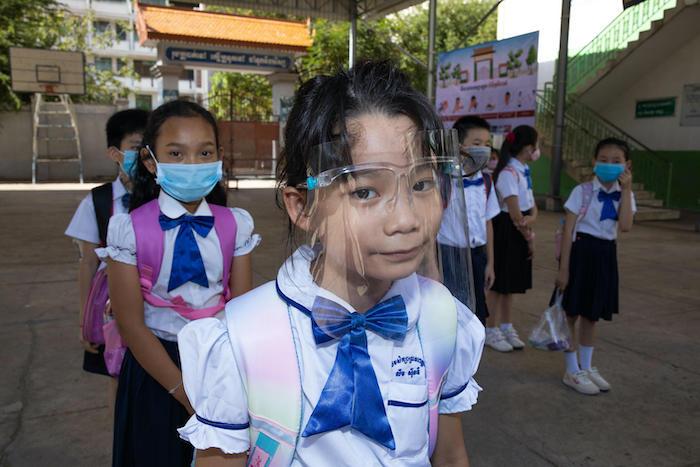
Students at Preah Norodom Primary School Phnom Penh, Cambodia during their second day of school re-opening. All the students, teachers and the school director wear masks in the school compound, maintain physical distancing and follow other best practices and the Ministry of Education, Youth and Sport’s (MoEYS) guidelines to stay safe from COVID-19. © UNICEF/UNI368153/Lychheang
“There has been a persistent myth that children are barely affected by the disease," said Henrietta Fore, UNICEF Executive Director. “Nothing could be further from the truth." That children can get sick and spread the novel coronavirus, Fore added, is "just the tip of the pandemic iceberg."
According to the Averting report, as of Nov. 3, children and adolescents accounted for 11 percent of the 25.7 million reported global infections, or 1 in 9 COVID-19 cases.
1 in 9 COVID cases is a child or young person under age 20
While this is not insignificant — and while children can transmit the virus to each other and to older age groups — the report cites strong evidence that, with basic safety measures in place, the net benefits of keeping schools open outweigh the costs of closing them. Schools are not a main driver of community transmission, and children are more likely to get the virus outside of school settings, the report concludes.
UNICEF report: schools are not a main driver of community transmission of COVID-19
And though this is encouraging news for the many schools that have cautiously reopened, as of November, 527 million students — about a third of total global enrollment — were still affected by school closures.
Meanwhile, disruptions continue in other critical service areas with potentially life-altering ramifications. According to the Averting report, new data show that:
- Coverage of essential health services — such as routine vaccinations, outpatient care for childhood infectious diseases and maternal health services — is down by 10 percent in a third of the countries surveyed;
- Nutrition service coverage has declined by 40 percent, across 135 countries, with 265 million children worldwide missing out on school meals; analysts estimate that an additional 6 million to 7 million kids will suffer from wasting or acute malnutrition in 2020 — a 14 percent jump that could mean 10,000 more preventable child deaths per month, mostly in Sub-Saharan Africa and South Asia; and
- Some 140 million more children will be pushed into poverty by the end of the year — many more than previously projected.
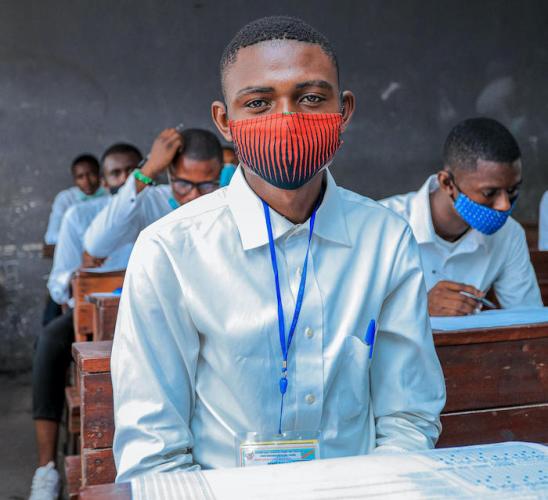
Justin, in his final year of secondary school in Kinshasa, DR Congo, sits for an exam. © UNICEF/UNI367491/Mulala
As governments around the world mobilize resources to save their economies, UNICEF urges, they must also commit to doing what is required to save and protect children's long term health and well being. "The future of an entire generation is at risk," Fore said.
To that end, UNICEF's six-point plan urges the world to take bold and unprecedented steps to:
1. Ensure all children learn, which includes closing the digital divide
2. Guarantee access to nutrition and health services and make vaccines affordable and available to every child
3. Support and protect the mental health of children and young people and bring an end to abuse, gender-based violence, and neglect in childhood
4. Increase access to safe water, sanitation and hygiene, and address environmental degradation and climate change
5. Reverse the rise in child poverty and ensure an inclusive recovery for all
6. Redouble efforts to protect and support children and their families living through conflict, disaster and displacement.
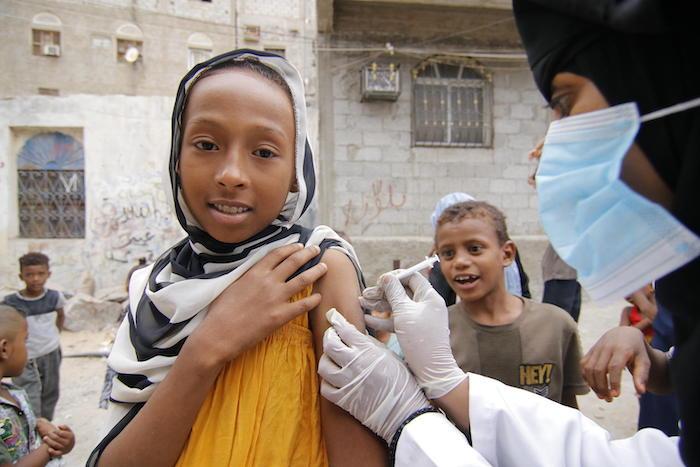
With UNICEF's help, children were vaccinated for diphtheria at Khawr Meksar clinic in Aden, Yemen, during the COVID-19 pandemic. © UNICEF/UNI349183/Fahdl
The UN General Assembly plans to take up these issues in a special session scheduled in early December — from UNICEF's standpoint, a key opportunity for decision makers to commit to the pillars of this six-point plan.
"Children will never accept a return to ‘normal’ after the pandemic because ‘normal’ was never good enough."
"This is not about a return to the way things were," Fore writes in the introduction to the Averting report. "Children will never accept a return to ‘normal’ after the pandemic because ‘normal’ was never good enough.
"Our post-pandemic rebuilding must meet the scale of this moment by overcoming our differences – and working across generations – to rebuild a world we want our children to grow up in."
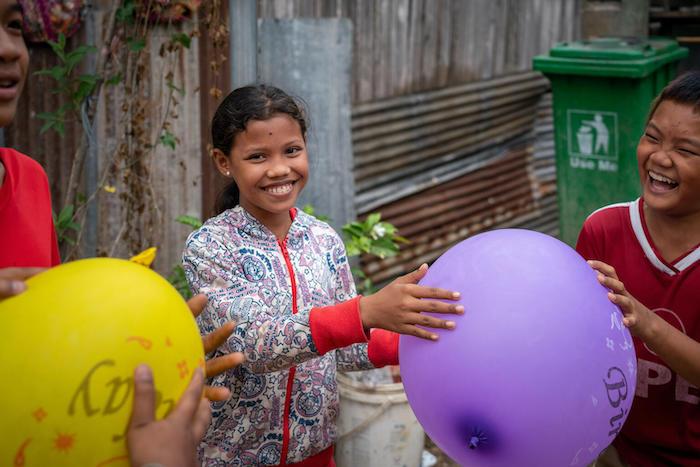
Sun, 14, of Doem Slaeng Village near Phnom Penh, Cambodia, says she want to be a teacher so she can make hundreds of young lives better. © UNICEF/UN0367586/Raab
For a deeper dive into the data behind UNICEF's Six Point Plan, read the full report.
Top photo: Dini feeds her year-old son Abdullah at their home in Paseban village, Central Java province, Indonesia. UNICEF is supporting the Ministry of Health in Indonesia to develop guidance on delivering essential nutrition services for mothers, infants, young children and adolescents during the COVID-19 pandemic. Due to the pandemic, services are provided through both community-level health posts and home visits from local health workers. During community health sessions mothers learn to administer vitamin A supplements to their children themselves. © UNICEF/UNI374528/Ijazah


